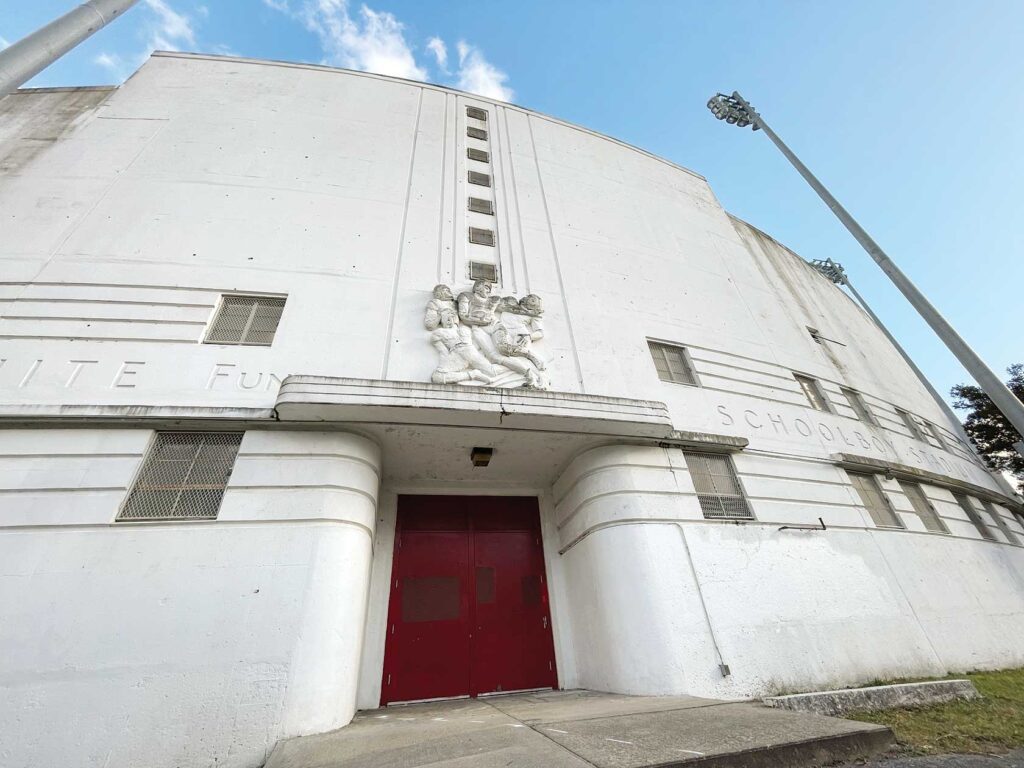
Mayor Michelle Wu last week appealed to Boston Public School parents for support for her administration’s controversial plan to lease White Stadium to a professional soccer team. In a December 23 email, Wu cited the reconstruction of the outdoor track, a re-surfaced playing field, modern locker rooms and a student lounge for students to use in the stadium on days when no soccer game is scheduled.
“BPS students will remain at the heart of this project, with at least 700 hours of BPS athletics programming annually—over 90% of stadium use,” Wu’s email reads.
The apparent push for public support came as the city made public the lease between the city and the soccer team — BOS Nation FC — last week, revealing details on how the sports team is expected to share White Stadium and Franklin Park with community members.
Under the terms of the lease, the city would maintain ownership of the stadium. The team would use the stadium for 20 game days and 20 practice days. The city has agreed to cover half the cost of the stadium reconstruction — currently $91 million of an estimated at $182 million.
Wu last year said the city would not spend more than $50 million on the project and would commit no resources to renovating the stadium without the soccer team’s involvement.
While high school sports teams would be allowed to use the stadium on days when there are no soccer games or practices, the high school football games the stadium has played host to for 75 years will no longer be permitted during the soccer season.
The lease allows for the city to make agreements with BOS Nation FC for concerts, corporate events and other gatherings.
Under the agreement between the city and the team, the team would renovate the existing west grandstand, which is currently being used by football and other sports teams, making it the home for the soccer team. The city would renovate the eastern grandstand, which was damaged in a fire and is not in use.
The city would pay for the reconstruction of the track surrounding the playing field and build out a headquarters for the sports department of Boston Public Schools in the eastern grandstand. The plans for the renovation of the stadium would demolish the basketball and tennis courts currently on the eastern side of the stadium.
Under the terms of the lease, the city will have a chance to review and suggest revisions to the National Women’s Soccer League schedule, but the ultimate decision on the schedule appears to be with the league.
Opposition
From its announcement last year, the project has sparked controversy, drawing fire from abutters groups opposed to what some say would amount to privatization of a public park. Game days would severely limit other groups’ ability to host events in the park, given that the city has pledged to restrict parking in and around the park during game days. Visitors to the planned 12,000-seat stadium would be required to park in satellite lots and take shuttle buses to the stadium.
Franklin Park hosts scores of official and unofficial gatherings during the summer — festivals such as the Caribbean Carnival, the Dominican and Puerto Rican festivals, Playhouse in the Park concerts, the Boston Area Musical Festival as well as family gatherings, birthday parties, baseball, cricket and soccer games. With game day parking restricted to the soccer team, shuttle buses, members of the press, stadium employees and vendors, it would likely be impossible for other large public gatherings to take place on game days.
In the sole carve-out for a community event, the lease prohibits the team from holding games on Juneteenth. Community members have for years held Juneteenth celebrations at the Shattuck Hospital side of the park the third Saturday in June.
On game days, the city would only allow cars with resident permit stickers to park within a mile radius of the stadium — a restriction that could inhibit public events and festivals at churches, the Museum of the National Center of Afro American Artists and Malcolm X Park, where community basketball tournaments are held.
Opponents of the project also object on the grounds that the city has not conducted a comprehensive traffic study of the neighborhood factoring in the potential impacts of the stadium and the planned redesign of Blue Hill Avenue.
The city is also planning to cull 145 trees from around the stadium and would restrict use of the public ways around the stadium on game days.
Where things stand now
The disclosure of the city’s $91 million commitment to the project raised eyebrows in City Hall, with District 3 Councilor Edward Flynn calling on the mayor to scuttle the project. High school sports facilities in Massachusetts have typically cost substantially less. The city of Lowell is spending $8 million to renovate a similar-sized facility, Smith College Professor Andrew Zimbalist pointed out in a Commonwealth Beacon op-ed.
The Emerald Necklace Conservancy’s court case against the stadium, which argues the re-purposing of public park land for private, for-profit use would violate the state constitution, is scheduled to move forward March 18.
City officials plan to begin demolition on existing structures in White Stadium in the fall. The team hopes to begin using a renovated stadium in spring of 2026.







